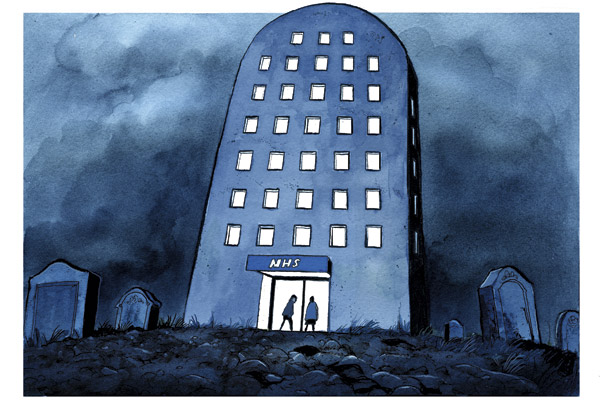What to do about the NHS? I’ve just been on a Newsnight which took as its premise that the model is broken and needs to be fixed. “Uncaring. Cruel. Inadequate. Lax,” said Kirsty Wark, opening the show. “Why is the NHS now failing so many patients?” The Keogh report is published tomorrow and is expected to be devastating – but not detailed enough: it’ll refer to 13,000 ‘excess’ deaths across 14 hospital trusts but it will not explain why these people died. Or even who they were: those who suspect they lost a relative due to NHS blunder will be none the wiser.
Towards the end of the show, Newsnight ran a graph from  the Nuffield Trust (right) suggesting that, if demographic pressures remain what they are, the NHS will need £54 billion while the parsimonious government is keeping funding flat. The graph looked deeply suspect to me. I suspect it took, as its premise, that the NHS could not be possible more efficient or productive. By now, I think it’s safe to assume otherwise.
the Nuffield Trust (right) suggesting that, if demographic pressures remain what they are, the NHS will need £54 billion while the parsimonious government is keeping funding flat. The graph looked deeply suspect to me. I suspect it took, as its premise, that the NHS could not be possible more efficient or productive. By now, I think it’s safe to assume otherwise.
If cash was the answer, than the NHS would be fixed by now. The great Labour mission (pdf) was to take UK health spending to the European average. It’s now 9.8pc of GDP, well clear of the EU average of 9.0pc (pdf). And UK health outcomes are still lousy. During the last decade Gordon Brown conducted a massive experiment: money was his aim, he doubled the NHS budget and saw what happened. The NHS did not (to put it mildly) become twice as good. It just grew fatter and more expensive. Bureaucrats accrued power that would have shocked hospitals in in Communist China (the Commie reference is not mine, but a remark from the recent BMA conference). And it was the power wielded by these managers, who overruled doctors, which is emerging as the primary fault behind the failings at Stafford Hospital and the others being outlined tomorrow. The ‘cash=care’ formula, which Brown dispoved, lives on in the form of the NHS being ‘ringfenced’ by the coalition. Labour made no such pledge nationally, and is cutting the NHS in Wales.
NHS reformers come in red and blue – and so do their enemies. I was a great supporter of Alan Milburn and then John Reid: two Labour health secretaries who thought the NHS could be a way of paying for health services but should not be a monopoly provider. How, they asked, was it ‘progressive’ to defend the rights and privileges of the bureaucratic elite running (some would say ruining) the NHS? It was Andrew Lansley, a Conservative, who sought easy applause by attacking Labour for reforming. When Brown supplanted Blair, reform died. The Tory attempt to out-emote Labour on the NHS reduced the health debate into a competition about who loved it more. Hard questions were dropped and reform was softly abandoned. It will now have to be taken up again.
In a verbless section of his 2010 conference speech, Cameron boasted about “the NHS – protected”. By which he meant that its budget was not being cut. But protected? Tell that to the victims of malpractice from Stafford to Cumbria to Manchester. The lazy assumption (shared by Brown, Cameron, Burnham and Lansley) was that if you keep writing the cheques, the NHS will not be an issue. So much for that. As tomorrow’s Keogh Report will make clear, being stuffed full of cash is not the same as protection. In fact, the NHS has been left vulnerable is not protected, but has been left at the mercy of a highly-paid and deeply dysfunctional bureaucratic class. The solution in 2013 is precisely the same as it was when Milburn advocated his reforms in 2003: to liberalise the NHS. To have it as a payment system, but not necessarily a provider. To transform it into a network of providers, private and public, to introduce far greater biodiversity.
But now, for the first time, there seems to be a real consensus behind reform. All else has failed – it’s time to liberalise the NHS, and do it properly. I never had much faith in Andrew Lansley. But in Jeremy Hunt, we might just have a Health Secretary with the energy and determination to finish what Milburn started. It’s shame that we had to lose ten years (and so many lives) in the process.
PS Camilla Cavendish of the Sunday Times was also on the panel: she has written so persuasively about the need for NHS reform that Jeremy Hunt asked her to conduct a review. It was published last week and you can read it here (pdf).
PPS Anyone interested in the flaws behind Gordon Brown’s approach – to focus on money shovelled in to the NHS – should read this National Audit Office report into the lessons of the last decade. It found hospitals running at negative productivity of 1.4pc a year. In its words:-
The past decade has seen consistent, significant increases in hospital funding. This was designed, in part, to deliver more productive behaviour. However, hospital productivity has fallen. The Department’s design and the NHS’s implementation of national initiatives were predominantly focused on increasing capacity, quality and outcomes of healthcare whilst maintaining financial balance, rather than on realising improvements in productivity.
But this is not an argument about statistics. Systemic failures in the way that hospitals are run carry a human cost: as we have seen in the Keogh report today.








Comments